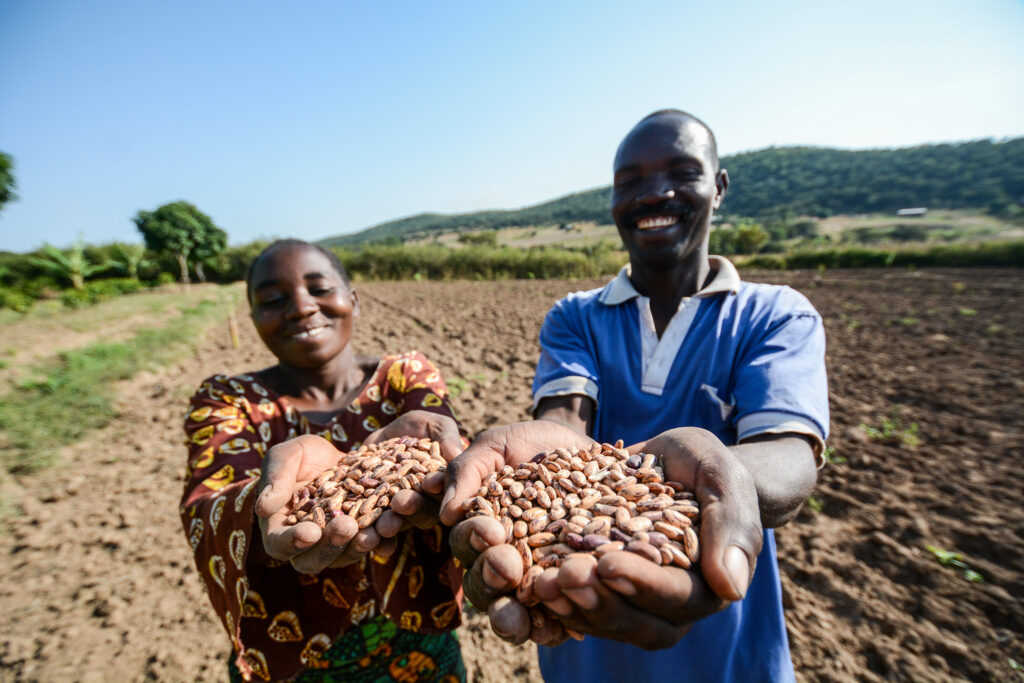Project objectives, results and activities
Objectives

The project’s overall objective is to promote scaling of legume-based agroecological intensification of smallholder maize and cassava cropping systems in SSA for water-food-energy nexus sustainability that enables food security and livelihood resilience.
The project specific objectives are:
SO1: To identify, develop and adapt legume-based agroecological intensification technologies/practices as well as innovations for rural energy and labour efficiency for smallholders, especially women.
SO2: To identify, develop and adapt innovations for transformative shifts in rural bioeconomies by generating new enterprises and rural employment (especially for youth and women) from legume-derived products and co-products, also to include transformational scaling approaches and pathways.
project results
Result 1:
Legume-based agroecological intensification scaling for climate-resilient productivity introduced in all 4 countries (WP1).
Result 2:
Legume-based agroecological intensification scaling for food & nutrition security introduced in all 4 countries (WP2).
Result 3:
Legume-based agroecological intensification scaling for water use efficiency introduced in all 4 countries (WP3).
Result 4:
Rural energy and labour-efficiency transformation pathways for legume-based agroecological intensification introduced in all 4 countries (WP4).
Result 5:
Legume-derived enterprises and employment for more resilient rural bioeconomies in all 4 countries (WP5).
Result 6:
Policy & institutional options for transformative scaling of legume-based agroecological intensification for enhanced livelihoods and resilience developed in all 4 countries (WP6).
Background
A “rural energy trap” is perpetuating poverty cycles of smallholders and their dependent rural communities, which have limited access to farm energy, mechanization and basic agricultural and agri-processing tools. Rural energy poverty can be defined as a situation in which access to energy in rural areas does not exist or has not been established. An energy deficit trap perpetuates rural poverty, particularly when the source of farm power is predominantly human labour. Where human labour is the primary source of farm energy, constraints are placed on smallholder both plot sizes and productivity (yields/ha). By the start of the rain’s smallholder farmers in much of SSA have insufficient food intake to generate the calories required to work more than 4 hours a day and cultivate much more than 0.5 ha using traditional hand hoe technology.
The prospects for rural communities in sub-Saharan Africa gaining access to grid-connected electricity remain remote for the decades ahead, placing a major impetus on initiatives to deliver off-grid energy for powering agricultural transformations of the smallholder sector in sub-Saharan Africa. The Sustainable Development Goals (SDGs) have included universal access to modern energy sources and services as one of the 17 targets to be reached by 2030, specifically stating that the goal is to “ensure access to affordable, reliable, sustainable and modern energy for all”. For smallholder farmers in sub-Saharan Africa, this is unlikely to happen unless there is a significant acceleration of research and innovations to feed into scale-out pathways for labour saving technologies and sustainable rural energy that are necessary for smallholder farming sector transformation in the face of climate change.
Many of these barriers have significant gender dimensions. Yet, legumes represent a strategic entry point for gender transformative agroecological intensification approaches, as legumes are considered women’s’ crops, primarily cultivated and processed by women. The scaling of legumes and associated benefits (including income) can be gender-transformative if women can retain control of income generated from legumes at larger economic scales. The contribution of legumes to food security and poverty alleviation can be substantial when bio-physical, socio-economic (including labour and gender), and market constraints (e.g. price volatility, insecure supply, market access and fragmentation, consumer preferences) are simultaneously addressed, fostering women’s empowerment. Ensuring access for poorer smallholders to legume-based innovations is essential, to ensure that the furthest behind can transition to more economically and sustainable farming systems.
Through an EU-beneficiary country partnership approach, this LEG4DEV project will work within and across eastern and southern Africa, to test, adapt and improve a portfolio of research innovations for diversifying maize or cassava dominated cropping systems by legume-based agroecological intensification. LEG4DEV will operate across value chains so that legume-based research innovations can be more readily adopted by farmers and enterprises and scaled out for impacts on livelihoods and resilience. Education and training partnerships will be facilitated between the LEG4DEV EU partners and African partner countries for building capacity in each beneficiary country for agroecological intensification for water-food-energy nexus sustainability, nutritional security & livelihood resilience.
